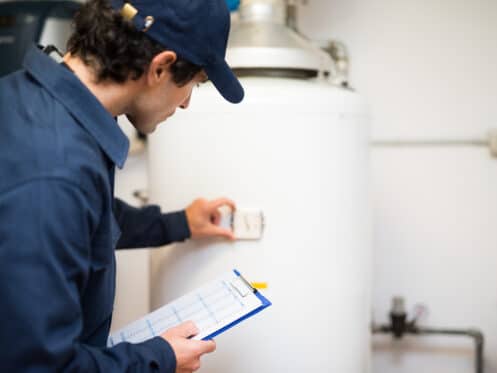If you want to maximize your investment in your home’s water heater, routine maintenance is essential. The industry recommendation is to schedule a plumber at least once a year and perhaps twice. Let’s explore the maintenance your water heater needs in advance of and throughout summer. Some of these steps are tasks you can tackle yourself. Many of them are jobs best left to the pros.
Inspect Your Water Heater
Whether you have a tank or tankless water heater, it’s important to check it each month. Keep the water heater area free of clutter that can combust or any items you don’t want wet. With a tank water heater, you want to scan all sides of the tank from top to bottom. Look for any signs of leakage from the valves or bottom of the tank. Watch for any rust or other corrosion. This may be a good time to consider water heater straps if you don’t have them. They’re not only for areas prone to earthquakes. Straps are a relatively inexpensive and simple upgrade that can help you avoid a major mishap.
Check and Adjust Water Heater Temperature
During spring maintenance in advance of summer, remove the thermostat cover and check the setting. The optimal setting according to the Department of Energy is 120 degrees Fahrenheit. It helps to avoid scalds and strikes the optimal balance between energy consumption and home comfort.
Should you keep your temperature even lower during summer? It depends. If the water heater is an air-conditioned area of the home, you should not. If it is in a garage, mud room, or other area that experiences high temperatures, it may make sense to do so. Consult with your plumber on this.
Note that electric tank water heaters have two thermostats. It is often recommended to have a small temperature difference between the two. Check with your plumber or owner’s manual.
Check the Anode Rod
All tank water heaters have a sacrificial anode rod. The purpose of the rod is to attract minerals and avoid buildup on the tank walls and, if applicable, heating elements. Anode rods generally last between three and five years. It does depend on the water quality in your area and how much hot water you use. It’s important to check the rod at least annually and replace it as needed. Failure to do so will shorten the lifespan of the water heater.
Flush the Water Heater Fully
Check the flush valve for your water heater and tighten it as needed every month. You should have a plumber flush your water heater at least once a year. Depending on water hardness and other qualities, you may need to do it twice a year. You need to disable power to the water heater or turn the gas to the pilot setting. Note that gas tankless water heaters use electricity too. Once the water heater has cooled a bit, you can flush it. For a tank water heater, flush it completely and then refill the tank.
Descale a Tankless System
For a tankless water heater, you’ll want to descale the unit at the same time. You can do this with household vinegar if you descale it regularly. You’ll also need a 5-gallon bucket and a sump pump. You generally need to flush it in this manner for 45 minutes, but check the manufacturer’s recommendation for your model. Prior to flushing, you should also clean or replace the air intake filter as needed.
Flush a Gallon Occasionally
If you have a tank water heater, it’s also a good idea to flush about a gallon every two months. Hot water usage goes up a lot for most households during spring and summer. That results in more sediment in your system. Flushing a gallon occasionally will get all that extra sediment from the bottom of your tank.
Inspect the Pilot Light
If you have a gas water heater, check the pilot light once a month. If it’s out, blow into the chamber to clear any residual gas, and relight it. If it’s any color other than blue, turn the system off, and call the plumber. You’ll also need the pilot light, thermocouple, and burner inspected and cleaned. You need a professional to do this in order to check the exhaust and ensure that the system is venting correctly.
Inspect the Heating Elements
If you have an electric tank water heater, you need a plumber to inspect the electric supply and heating elements. These units have an upper heating element connected to an upper thermostat. They also have a lower heating element connected to a lower thermostat. Your plumber may need to clean these elements if there is limescale or other accumulation.
Check the Discharge Pipe
Each month, look into the discharge pipe and ensure it’s free of blockages. Obstructions are not common. If you do have an obstruction, you may be able to vacuum it out, or household vinegar should do the trick. If it does not, call your plumber.
Test the Temperature and Pressure Relief Valve
The modern water heater is a very safe appliance. Tank explosions and the like are practically unheard of when it comes to modern systems. One reason for this is a simple innovation like a T&P valve. If pressure ever gets too high, it releases it. You should test it each month. Raise and lower the small lever several times. You should hear gurgling, and water should flow into the discharge pipe. If it does not, you should call your plumber to replace it.
Use the Vacation Mode for Extended Getaways
Summer is a time when many people are away from their homes for extended periods. Whenever you intend to be away for 48 hours or more, put your water heater in vacation mode. This will save energy, avoid wear and tear on the system, and help prevent any mishaps. If you do not have a vacation mode, simply lower the thermostat to the lowest possible setting. It’s generally not recommended to turn your water heater off entirely. Consult with your plumber before doing that.
Insulate the Cold and Hot Water Lines
Install foam insulation on your water heater if you don’t have it. If you do have it, check it and replace it as needed. That insulation is important during the warmer months to protect against condensation.
Remove the Water Heater Jacket
Most plumbers do not recommend water heater jackets. If you’re considering one, check with your plumber. If you have one, you likely want to remove it for summer. This is particularly important for electric units because wiring and electrical components can overheat.
Professional Water Heater Maintenance in Boylston and Falmouth
If you need water heater maintenance in Falmouth or Boylston, DeWolfe Plumbing, Heating & Cooling is here to help. Our plumbers also perform camera inspections, clean drains and sewers, and pipe and repipe water, sewer, and gas lines. We hook up gas and water appliances.
You can also count on us to install fixtures, tank and tankless water heaters, water treatment systems, and garbage disposals. Our HVAC technicians specialize in boilers, furnaces, air conditioners, heat pumps, and ductless mini-splits. Call us today to schedule an appointment or with any further questions about our plumbing services.


